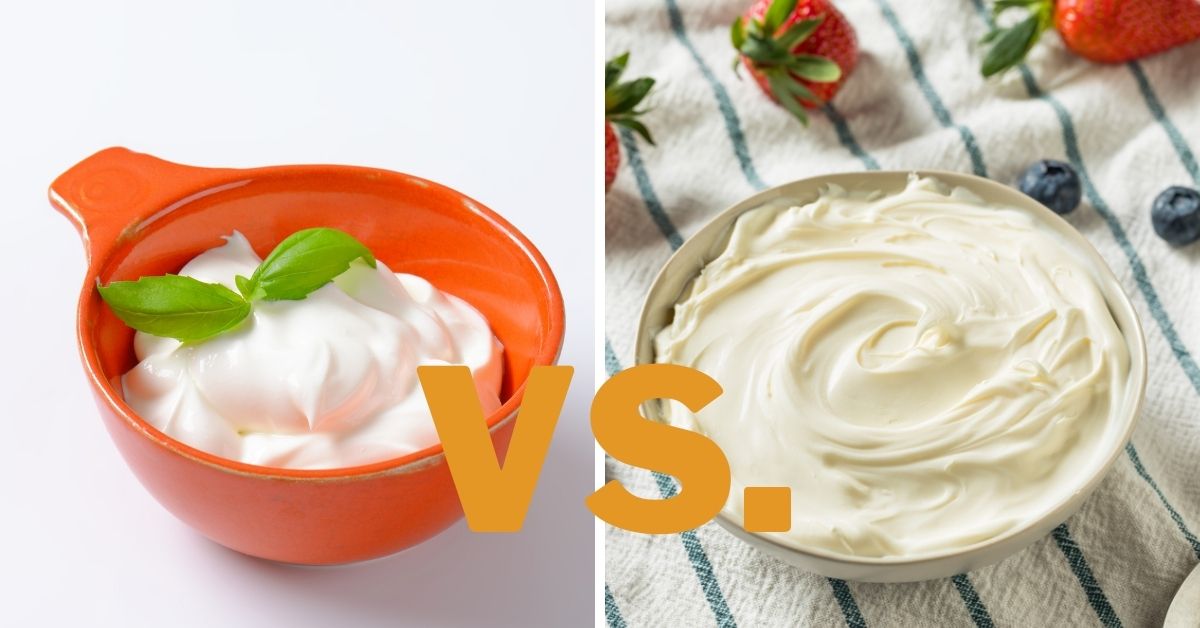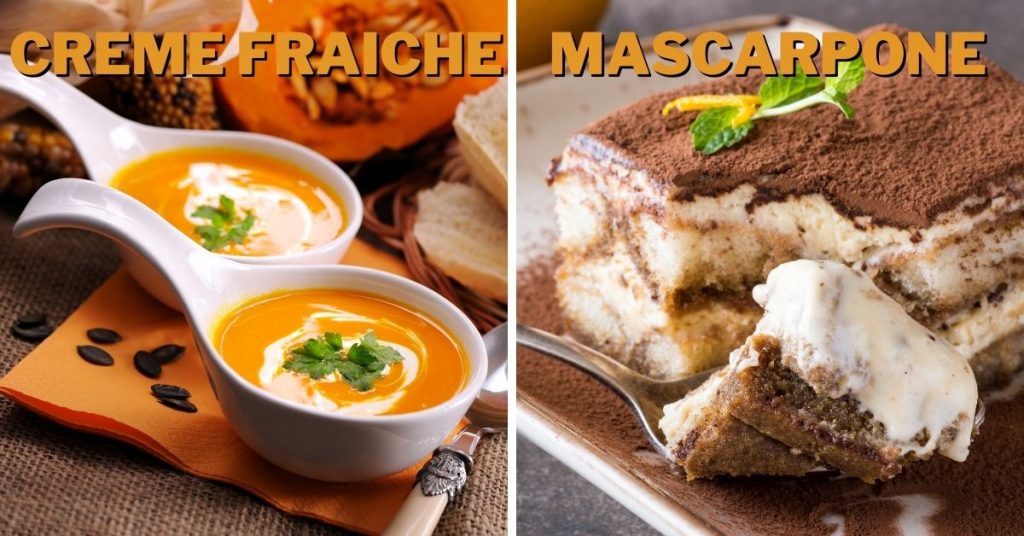Crème Fraiche vs. Mascarpone: Differences & Which Is Better?

Considering that crème fraiche and mascarpone have the same origin, they share some similarities. Both are rich in flavor, stimulating your taste buds, making their degustation an extraordinary experience. But, what are the differences between crème fraiche and mascarpone, and which is better?
Mascarpone and crème fraiche both come from heavy cream, but mascarpone is a type of cheese and crème fraiche is a type of sour cream. As a result of the different production processes, they taste different. Crème fraiche is mild, and mascarpone is heavier. Both have their purposes, but they can often substitute for each other.
Both crème fraiche and mascarpone are very near to my heart, so I’ve gained quite an experience to share. As enriching as they can be, improper use could largely diminish their potential. The following paragraphs discuss the use, nutritional value, taste, texture, and production processes of mascarpone cheese and crème fraiche.
Crème Fraiche vs. Mascarpone: Differences?
Having heavy cream as their root ingredient, crème fraiche and mascarpone are bound to share some similarities, but considering their production processes, they must have differences too.
The most evident difference is that crème fraiche is, in fact, sour cream, and mascarpone is a type of cheese.
Production
Mascarpone and crème fraiche are basically processed heavy cream. However, the production process of mascarpone requires more knowledge, skill, and resources.
While crème fraiche is produced by adding lacto bacteria to the heavy cream, mascarpone comes as a result of an acidic reaction.
The full-fat heavy cream is mixed with tartaric or citric acid to separate the crudes from the whey. After forming, the crudes are cooked until they homogenize in a single creamy product- mascarpone.
On the other hand, crème fraiche is simpler to make by just adding bacterial cultures to the heavy cream, making it ferment.
Neither crème fraiche, nor mascarpone requires aging, so they can be consumed shortly after making.
Taste
Because crème fraiche is obtained by means of heavy cream fermentation, it has retained the creaminess, richness, and butteriness of the heavy cream, but it is also distinctively fresh, slightly tangy, and mildly salty.
Mascarpone also has a buttery flavor, rich and creamy, but is milder-tasting than crème fraiche. Compared to crème fraiche, it’s more neutral, but significantly richer and creamier.
Both are rich and creamy, but because of the higher fat content, mascarpone is significantly more buttery than crème fraiche. In turn, crème fraiche is tangier and fresher than mascarpone.

Nutritional Value
This is probably where crème fraiche and mascarpone are most similar. Nutrition wise, crème fraiche and mascarpone are highly saturated in fats and high in calorie. Crème fraiche contains about 30% fats, while mascarpone contains whooping 45 to 55%.
Both mascarpone and crème fraiche are high in lactose, but on the bright side, they are low in sugars and carbohydrates. In fact, mascarpone doesn’t contain any sugar, while the sugar amount in crème fraiche is negligible. Because of the low carbs, they are both a great addition to a low-carb, high-fat diet, such as the Keto diet.
Mascarpone and crème fraiche are also low in protein, but since their proteins come from animal origin, they are considered very nutritious, and regardless of the small protein amount, they are still good choices for a high protein diet. [1] [2]
Another nutritional similarity between these two dairy products is the poor mineral and vitamin content. Both aren’t rich sources of these micro-nutrients. However, crème fraiche is the richer of the two, with a higher amount of calcium than mascarpone.
Although not rich in vitamins and minerals, the fats mascarpone consists help in the dissolution and absorption of vitamin A, D, E, and K. It is also good for bone health, since it contains a decent amount of calcium.
Crème fraiche, on the other hand, is good for bone health because of the calcium. Also, it is good for gut health because the bacteria used for its fermentation have a beneficial impact on the digestion process. However, there aren’t any other health benefits.
Because of the high lactose amount both mascarpone and crème fraiche consist, you should be careful about their consumption if you have even the slightest lactose intolerance or milk allergy.
Considering that they are high-fat and high- calorie cheeses, mascarpone, and crème fraiche are very satiating, so chances are, you won’t be able to consume them in large quantities. Anyway, you shouldn’t consume them daily, even if your organism handles them well.
Use
Crème fraiche is a great addition to omelets, baked goods, smoothies, or soups. It also works great to enrich pasta sauces, though not as the sauce base, and as a dip, especially for fresh dipping food. Because of its mild, almost neutral, but still recognizable flavor, you can use it in sweet and savory dishes that need a bit more zest, tang, and edge.
Mascarpone, on the other hand, is the king of desserts. It’s irreplaceable for tiramisu and cheesecake and works amazingly in many other deserts that need the nutty, buttery creaminess only mascarpone can provide. Still, it fits nicely as a pasta sauce, especially when mixed with heavy cream or milk and can enrich your pastries as it spreads and smears perfectly.
| Differences | Mascarpone | Crème fraiche |
|---|---|---|
| Production | Heavy cream treated with tartaric or citric acid, then heated until the curds homogenize | Fermented heavy cream |
| Texture | Creamy, smooth and thick | Thick, and creamy |
| Use | Used for cheesecakes, tiramisu, but also for pasta sauces | Smoothies, fruit salads, as salad toppings, soup additions, omelets, or sauce thickeners |
| Health impact | Good bone health. The high-fat amounts boost the absorption of vitamins A, D, E, and K | Good for bone and gut health, but no other health benefits |
| Taste | Neutral, yet rich, nutty, and very creamy | Tangy, slightly sour, and mildly salty |
Crème Fraiche or Mascarpone: Which Is Better?
Each at its best when properly used, crème fraiche and mascarpone are incomparable in many aspects. In terms of use and taste, they have their advantages and disadvantages, but both are high- quality cheeses. Nutrition wise, they are both very similar and which you use depends on the dish and your personal preference.
Crème Fraiche or Mascarpone for Tiramisu?
Although using crème fraiche for this desert won’t be the worst decision, mascarpone is irreplaceable for tiramisu. The thickness and creaminess mascarpone offers, cannot be obtained with any other cheese, but if you are freshness and lighter texture, crème fraiche could do a good job here.
Crème Fraiche or Mascarpone for Pasta?
Considering that crème fraiche and mascarpone have already proven to be excellent pasta additions, you can use whichever you like best. Mascarpone is heavier though, and it will significantly thicken the sauce, while crème fraiche, as the lighter option, would add zest and freshness.
Crème Fraiche or Mascarpone for Cheesecake?
Mascarpone is known for its use in deserts such as cheesecake, but don’t underestimate crème fraiche either. Because cream cheese is the key ingredient in cheesecake, it would taste differently depending on which cheese you use.
But, that doesn’t mean that using crème fraiche instead of mascarpone or vice versa would ruin the taste. So, they both could do a good job here, based on your preference.
Crème Fraiche or Mascarpone for Pavlova Cake?
Considering that the addition of vinegar or lemon acid is a part of the preparation process for Pavlova cake, mascarpone would be the logical choice here, since it also contains acidic elements.
However, it isn’t a mistake to use crème fraiche either, though it won’t be able to deliver the thick creaminess as mascarpone does.
Crème Fraiche or Mascarpone for Ice Cream?
Mascarpone does better in the freezer than crème fraiche, so for ice cream, it would be the far better choice. Crème fraiche doesn’t hold well when frozen, and the defrosting process is a bit complicated. However, it isn’t unheard of to use crème fraiche for ice cream, but it isn’t the best option.
Can You Use Crème Fraiche for Mascarpone?
Crème fraiche is closest to mascarpone, so it substitutes for mascarpone just fine. Still, you can’t expect the same flavor, as crème fraiche will certainly show its tangy and zesty side.
Can You Use Mascarpone for Crème Fraiche?
Whereas crème fraiche is an excellent substitute for mascarpone, the reverse isn’t always so. Since crème fraiche is stronger-tasting than mascarpone, the dish will significantly lose flavor if you make this substitution. Where crème fraiche adds flavor when substituting for mascarpone, mascarpone doesn’t have this ability, and a dish that is supposed to be zesty would become mild and bland.
